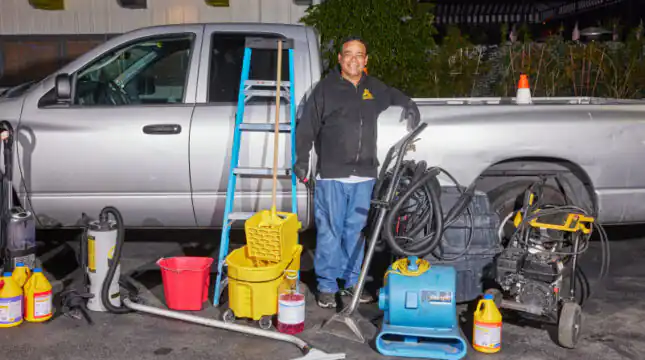1. Decide what type of cleaning business to start
What kind of cleaning company do you want to run? Build your cleaning business around one or more of these tasks.
Ideas for residential cleaning
A house cleaning business servicing private homes, aka maid service, is a popular model for cleaners. Specialized services can help you stand out — and you may also be able to charge more, too. Cleaning services for homeowners could include:
- Window washing
- Pressure washing (for driveways, patios, decks, home exteriors and more)
- Roof cleaning
- Gutter cleaning
- Duct cleaning
- Pet odor removal
- Allergen removal
- Carpet cleaning
- In-home laundry
Commercial cleaning ideas
Commercial cleaning clients can be profitable — especially if you find a steady niche. You could specialize in services such as:
Niche and specialty cleaning
Just about everything out there needs to be cleaned at some point. Another way to drum up new clients could result from a focus on one of these niche areas:
- Disaster cleanup (crime scenes, fires, floods and so on)
- Junk hauling and recycling
- Decluttering and organizing services
- Pool cleaning
- Car detailing
- Boat or RV cleaning
- Short-term rental cleaning (like AirBnBs)
- Event or festival cleanup
- Construction cleanup
- Trash can, compactor, and Dumpster cleaning
- Tile and grout cleaning
Some of these more specialized cleaning services may require specific cleaning supplies, tools and cleaning insurance. You might even need licensing or certification depending on what services you offer and where your business is located. Check with your local government to find out more.
2. Set up your cleaning business structure
Once you choose the right kind of cleaning business to start, you can make it official by establishing a formal structure and registering with the state. Here’s a checklist for getting started:
- Decide whether your business will be structured as a sole proprietorship, partnership, an LLC or a corporation.
- Register your company name with the state.
- For structures other than a sole proprietorship, file your articles of incorporation or organization.
- Request your employer identification number (EIN) from the IRS.
- Buy business insurance for cleaners to help protect your business, your employees, your business vehicles, the gear you need to do your job and yourself. Most cleaning services get general liability insurance and add on additional policies as needed.
- Obtain the licenses or certifications you might need for your cleaning business. (You may not need any.)
3. Set up standard operating procedures (SOPs)
Create policies to help make sure you’re running the business safely and efficiently. These policies might include:
- How to book your clients: Make it easy for customers to book you by phone, web or email; both first-time customers and repeat clients.
- Track your cleaning stock and inventory: Decide who will be in charge of inventory management and how they will stay on top of inventory. This might mean a simple spreadsheet and color coordinating cleaning products by employee or type of job.
- Create “time to clean” benchmarks: Knowing how long a job should take can help to increase efficiency and keep bookings on schedule.
- Safety procedures: Create policies to work with toxic chemicals, including when to wear gloves and eye protection.
- Pet policies: Request that clients inform you of any pets and secure them when you’re on their property. Include your pet policy in your booking documentation up front.
- Limit heights and ladders: Cleaning above your head or on ladders can be risky. Make sure you and your staff are trained properly. Consider adding an extra fee for this service.
- Waste removal policy: Jobs that require cleaning up biohazards or other dangerous materials may require additional protection (and an additional fee).
4. Develop pricing structures for your business
Pricing can make or break your cleaning business. Research your market and competitors’ offerings to see what’s common in your local market. Create a pricing formula or framework based on square footage, project type, and the complexity of the job. You’ll need to know your average project costs (including labor, supplies and overhead); then add your desired profit margin and divide by square footage.
You can also create multiple pricing tiers for services such as:
- Maintenance cleaning
- Deep cleaning
- Move-out cleaning
- Introductory rates
- Weekly vs. monthly packages
- Specialty supplies
Make sure you consistently check your pricing against your labor and materials costs so you can help ensure a profit.
5. Create a marketing strategy to advertise your cleaning business
Marketing your cleaning business can help you position yourself as the best solution for your customers’ needs. Think about your ideal customer and how you can reach them:
- Ask for referrals: Networking and referrals rely on word-of-mouth marketing to increase your client base. Consider creating a referral program to provide extra benefits to clients who refer you to new leads. Contact real estate agencies, home builders, and other companies that might refer you to others.
- Call potential clients: Cold calls can be effective for cleaning businesses. Reach out to new companies in your area who may be looking for a cleaning service, or craft an offer that might persuade established companies to switch to your business.
- Show up in social: Social media is an excellent way to show off your work, build relationships with potential clients, and reach new markets. Show up consistently with useful information and be sure to engage authentically with your followers.
- Buy local ads: Geotargeted ads (like “cleaning service near me”) can help you reach people who are searching for a business like yours.
- Automate client reminders: Use a booking system that lets your clients manage their account with you and build in regular reminders before and after every service. You can remind them of your policies, keep billing on track or invite them to schedule a new service.
6. Hire and train more cleaners when you need them
To build your cleaning business and grow your revenue, you may have to hire more staff.
Keep the focus on customer service and safety: You can train new hires to clean efficiently, but how they perform on the job could mean you win or lose clients. Run background checks and offer a paid trial period to protect your business.
To master professional cleaning skills, you can help your employees earn a certification from the International Sanitary Supply Association (ISSA) or the Inspection, Cleaning, and Restoration Industries (IICRC).






